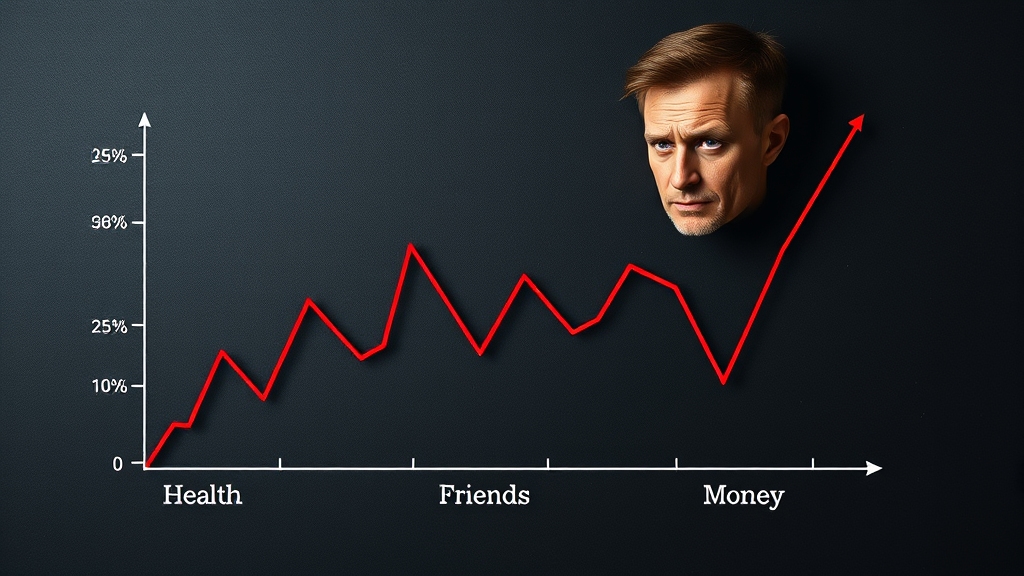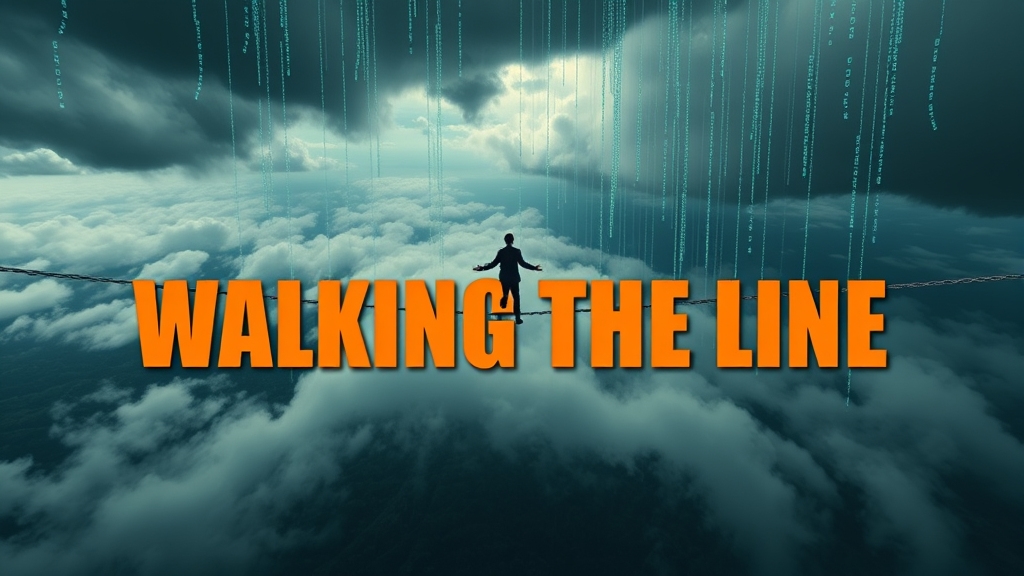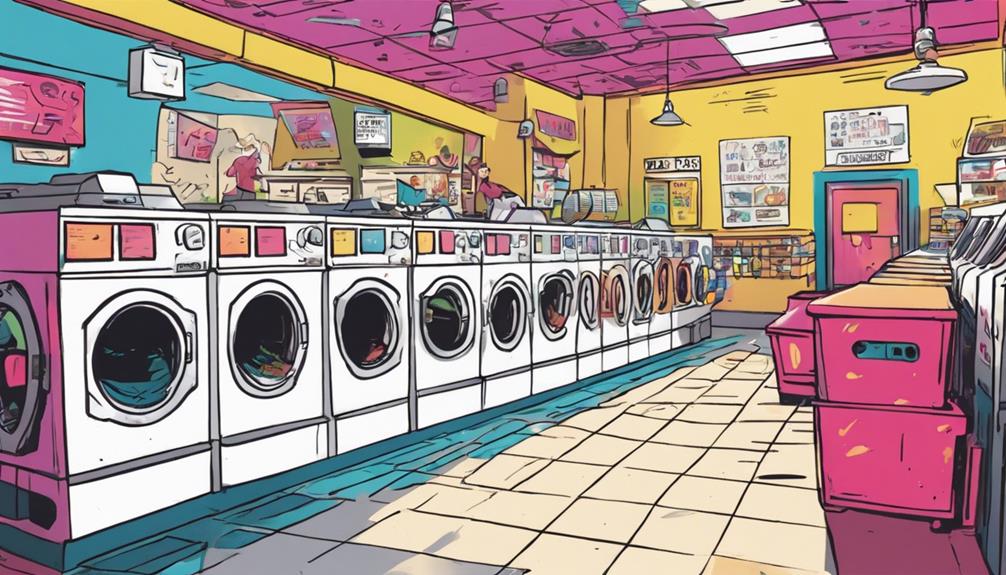Three years ago, I thought I had it figured out. I was about to launch what I believed would be the next big thing in AI. Fast forward to today, and I’ve burned through my savings, watched my relationship crumble, and pitched 300 times before getting a single yes. I remember one investor call that ended at exactly 5pm when my business account got deactivated for insufficient funds. But here’s what no one tells you about the startup journey—the real cost isn’t measured in dollars. It’s measured in sleepless nights, anxiety attacks, and the constant weight of knowing that other people’s livelihoods depend on your decisions. The success stories you read about? They’re not telling you the whole truth.

The Myth vs Reality Gap
Every week, TechCrunch publishes another story about a twenty-something founder who raised fifty million dollars for their revolutionary app. The photo shows them standing confidently in a sleek office, arms crossed, with that signature entrepreneur smile. The headline reads something like “Former College Dropout Builds Billion-Dollar Empire in Two Years.” These stories flood our feeds constantly. LinkedIn celebrates another unicorn valuation. Twitter buzzes about the latest acquisition. Instagram shows founders ringing the NYSE bell. What does this constant stream of success stories do to our perception of entrepreneurship? It creates a fantasy world where startups are glamorous, fast-paced, and almost guaranteed to succeed if you just work hard enough.

But here’s what those polished magazine covers don’t tell you. The painful truth? Well over half of tech startups collapse before year five. Not struggle, not pivot successfully, not get acquired for a modest return. They die. The founders lose everything they invested, both financially and emotionally. The employees find new jobs and move on with their lives. The product disappears from app stores and websites. Yet we never see those stories featured prominently. When was the last time you saw a headline that read “Local Entrepreneur Loses Life Savings, Returns to Corporate Job After Three Years of Struggle”? These failures don’t generate clicks or inspire venture capital marketing campaigns. They just quietly vanish from the narrative, creating a massive survivorship bias in how we understand startup reality.

Social media makes this problem exponentially worse. Every platform bets on the highlight reel, silencing founders’ panic over runway and layoffs. Founders post photos of their latest product launch, their growing team, their speaking engagements at conferences. They share screenshots of positive user feedback and celebrate every minor milestone. Meanwhile, they’re privately dealing with cash flow problems, key employee departures, and sleepless nights wondering if they can make payroll next month. The algorithm doesn’t care about authentic struggles. It promotes content that generates engagement, which usually means success theater rather than honest documentation of the entrepreneurial journey.
Take Pandora, for example. Most people think of it as an overnight digital music success story. The reality tells a completely different tale. Tim Westergren and his co-founders started the company in 2000. They went through multiple near-death experiences, couldn’t pay employees for two years, and Westergren personally pitched to VCs over 300 times before securing meaningful funding. The company didn’t go public until 2011. That’s eleven years from founding to IPO, not the eighteen months that media coverage typically suggests for “fast-growing” startups. This wasn’t an overnight success. It was a decade-long struggle that happened to work out eventually.
What happens when new entrepreneurs enter the game expecting the myth but encountering the reality? The psychological impact can be devastating. They start their company expecting rapid growth, easy funding, and quick validation. Instead, they face months of customer rejections, investor meetings that lead nowhere, and product launches that nobody notices. The disconnect between expectation and reality creates a unique form of entrepreneurial depression. They begin questioning not just their business idea, but their fundamental competence as human beings. They wonder why everyone else seems to be succeeding while they’re struggling with basic tasks like getting their first paying customer.

The pressure to maintain the success facade becomes overwhelming. Founders feel compelled to post optimistic updates on social media even when their company is falling apart. They attend networking events and pitch competitions, presenting confident visions of their future while privately knowing they have six weeks of runway remaining. They give interviews to local business publications about their “exciting growth trajectory” while laying off half their team the same week. This constant performance requires enormous mental energy and creates a psychological split between public persona and private reality that can be genuinely damaging to mental health.
Venture capital firms and startup accelerators actively contribute to these false narratives. Their marketing materials showcase only their biggest successes, creating promotional content that makes entrepreneurship look like a reliable path to wealth and recognition. They host demo days filled with polished presentations and optimistic projections. They publish case studies about companies that achieved massive valuations, while quietly writing off the much larger number of investments that returned nothing. These institutions have strong financial incentives to perpetuate the myth that startups are good investments and entrepreneurship is an attractive career path, regardless of the statistical reality.

The gap between LinkedIn posts and daily reality reveals the true depth of this problem. Scroll through any founder’s LinkedIn feed and you’ll see updates about exciting partnerships, product milestones, and team expansions. You’ll read posts about lessons learned and gratitude for the journey. What you won’t see are the panic attacks in parking lots before investor meetings. You won’t read about the arguments with co-founders over equity splits. You won’t learn about the three months they couldn’t afford health insurance or the relationship that ended because startup stress consumed their emotional availability. The platform’s professional nature demands that founders present their best selves, creating an echo chamber where everyone appears to be thriving while privately struggling with identical challenges.
This myth-reality gap creates profound isolation among entrepreneurs. Each founder believes they’re the only one facing serious problems because everyone else seems to have figured it out based on their social media presence. They’re embarrassed to admit they’re struggling because it feels like admitting failure in a community that celebrates only success. They stop sharing honest updates with friends and family because they don’t want to appear incompetent or validate the concerns of people who warned them against leaving stable employment. The result is a community of individuals who desperately need support but feel unable to ask for it because they believe their struggles are unique.

Here’s the truth that nobody wants to acknowledge: the success stories you see everywhere are statistical outliers, not representative examples of typical entrepreneurial outcomes. For every founder featured on magazine covers, thousands of others are quietly returning to traditional employment after their startups consumed their savings and several years of their lives. The companies that achieve massive valuations represent less than one percent of all startups. Even among venture-backed companies, which already represent a tiny fraction of all new businesses, the majority fail to return their investors’ money. These aren’t encouraging statistics, but they represent the actual landscape that new entrepreneurs will navigate, not the fantasy world portrayed in startup media coverage.
Understanding this gap between myth and reality isn’t about discouraging entrepreneurship or celebrating failure. It’s about preparing people for what they’ll actually experience so they can make informed decisions about whether the real costs are worth the potential rewards. So what happens when your launch day isn’t a media frenzy but another rejection email? Let me show you.
The Financial Quicksand
The financial reality hits harder than any rejection email ever could. When you read startup success stories, fundraising sounds almost trivial. The founder had a great idea, pitched to some investors, and raised five million dollars to build their dream company. These articles make it seem like raising money is just another milestone on the entrepreneurial checklist, something you can accomplish with a solid business plan and a confident presentation. The media coverage focuses on the announcement, the valuation, and the growth plans. What does this simplified narrative do to aspiring entrepreneurs? It creates the dangerous illusion that funding is readily available for good ideas and competent founders.

The actual fundraising process resembles psychological warfare more than a business transaction. Tim Westergren pitched to VCs more than 300 times before securing meaningful funding for Pandora. Each pitch requires weeks of preparation, from updating financial projections to rehearsing presentation slides to researching investor backgrounds and portfolio companies. You spend entire days crafting the perfect email introduction, only to receive automated responses or complete silence. The few investors who agree to meetings often ask detailed questions about market size, competitive advantages, and revenue projections that reveal how little they understand your specific industry or business model.
The emotional toll of constant rejection during fundraising can’t be overstated. Every “no” feels personal, even when investors claim it’s just about portfolio fit or timing. You start questioning whether your idea makes sense, whether your team is strong enough, whether you’re fundamentally cut out for entrepreneurship. The process can stretch for months, during which your existing runway continues burning while you’re focused on pitching instead of building your product or acquiring customers. Many founders describe fundraising as the most demoralizing experience of their entrepreneurial journey, far worse than product failures or customer complaints.

Here’s what nobody mentions about startup expenses: incorporation, compliance, server and bandwidth costs drain your bank account faster than employee salaries. Infrastructure costs hit technical startups particularly hard. One founder needed low-latency video capabilities for his product, which required expensive server configurations and bandwidth costs that scaled directly with user adoption. These technical requirements aren’t optional nice-to-haves. They’re fundamental to the product working at all. When your core functionality depends on expensive third-party services or specialized hardware, your burn rate accelerates far beyond what simple salary calculations would suggest.
Personal financial sacrifice becomes inevitable when startup funding doesn’t materialize as quickly as expected. Founders max out credit cards to cover both business expenses and personal living costs. They borrow money from family members, creating awkward relationship dynamics when repayment becomes uncertain. Many sell personal assets like cars, stocks, or jewelry to extend their runway by a few more months. One entrepreneur was slowly selling off his Amazon stock just to pay for his apartment and pay for the infrastructure for the product. These aren’t dramatic desperate measures. They’re standard operating procedure for most bootstrapped startups.
The psychological impact of watching your savings disappear while revenue remains elusive creates a unique form of financial anxiety. You calculate daily burn rates obsessively, knowing exactly how many weeks of operation you have remaining at current spending levels. Every unexpected expense, from a broken laptop to a higher-than-expected server bill, triggers genuine panic about whether you can afford to continue. Sleep becomes difficult when you’re mentally running through worst-case scenarios about bankruptcy, damaged credit scores, and the shame of returning to traditional employment with less money than when you started.
Startup financing creates an impossible catch-22 that traps many founders in unsustainable situations. Investors want to see traction before they’ll provide funding, but achieving meaningful traction often requires resources that only funding can provide. You need money to hire developers, but you need a working product to attract developers who’ll work for equity instead of cash. You need customers to prove market demand, but you need marketing budget to reach potential customers effectively. This circular dependency forces founders into increasingly desperate bootstrap scenarios where they’re trying to accomplish everything simultaneously with insufficient resources.
The responsibility for employee compensation creates crushing pressure that extends far beyond your personal financial situation. You’re not just managing your own money anymore. You’re responsible for ensuring other people can pay their rent, support their families, and maintain their standard of living. When cash flow becomes tight, founders often stop paying themselves entirely while continuing to pay their team members. The guilt of layoffs becomes overwhelming when you realize you’re not just ending someone’s employment but potentially disrupting their entire financial stability and career trajectory.
Financial stress fundamentally compromises decision-making quality in ways that compound over time. When you’re worried about making payroll next month, you start making short-term decisions that sacrifice long-term product vision. You pivot to whatever might generate revenue quickly, even if it moves you away from your core mission. You take on consulting projects or rush half-finished features to market because you need cash flow immediately. These desperate measures rarely create sustainable business foundations, but they become necessary when survival is the primary concern.
Most people don’t realize that even successful startups operate at a loss for years before achieving profitability. Companies that eventually become household names often burn through millions of dollars and multiple funding rounds before generating positive cash flow. One founder shared that even after raising money and launching multiple products, his company still wasn’t profitable. He mentioned that one product peaked at around 12K in recurring revenue while another capped at around 8K MR, but they were still losing money overall. These numbers represent years of work and significant investment with no guarantee of eventual profitability.
Here’s the sobering financial reality: most founders end up financially worse off than if they’d kept their corporate jobs and invested their savings in index funds. The majority of startups fail completely, leaving founders with depleted savings, damaged credit, and years of lost earning potential. Even among the small percentage that achieve modest success, the financial returns often don’t justify the risk and sacrifice when compared to traditional career paths with steady income growth and retirement contributions.
When you’re selling off your Amazon stock just to pay next month’s server bill, you’ll know the real cost isn’t in your bank balance—it’s in your sleepless nights. But the financial pressure is only part of the story. The psychological toll runs much deeper than empty accounts.
The Rejection Addiction
Every “no” you hear rewires your brain in ways that go far beyond simple disappointment. When you’re running a startup, rejection becomes your daily bread. Imagine facing an average of twenty “no” responses for every single “yes” you receive. That’s not an exaggeration. Tim Westergren pitched to VCs more than 300 times before securing meaningful funding for Pandora. Potential customers dismiss your product without trying it. Talented employees choose other opportunities over joining your team. Business partners decline collaboration proposals. Even advisors who initially express enthusiasm eventually stop returning your calls. What does this constant barrage of rejection do to your brain? It rewires your neural pathways in ways that fundamentally change how you perceive yourself and your worth as a person.
Your brain starts treating each rejection as a personal attack rather than a business decision. When an investor passes on your startup, your mind doesn’t process it as “this opportunity doesn’t fit their portfolio strategy.” Instead, it translates to “I’m not smart enough” or “my idea is worthless.” This isn’t a character flaw or emotional weakness. It’s how human psychology responds to repeated negative feedback. Each “no” creates a small wound in your confidence. These wounds accumulate over time, creating deep psychological scars that affect every aspect of your decision-making process.
Let me break down the specific types of rejection that haunt every founder’s journey. Ghost investors represent perhaps the most maddening category. These are investors who express genuine interest in your company, schedule follow-up meetings, request detailed financial projections, and then simply vanish. They don’t respond to emails. They don’t return phone calls. They leave you wondering whether you said something wrong, whether your numbers didn’t add up, or whether they were ever serious about investing in the first place. This ghosting behavior creates a special kind of psychological torture because you never receive closure or constructive feedback.
Then you have the “maybe later” customers who string you along for months without ever committing to a purchase. These prospects attend product demos, ask detailed questions about features and pricing, and express enthusiasm about solving their business problems with your solution. They request proposals, negotiate contract terms, and involve multiple stakeholders in evaluation meetings. But when it comes time to sign agreements and transfer payment, they always need “just a few more weeks” to finalize their decision. These extended sales cycles drain your emotional energy while providing false hope about incoming revenue.
Advisors who promise help but disappear create another painful category of rejection. These are typically successful entrepreneurs or industry veterans who offer to mentor you, make introductions to potential investors, or provide strategic guidance based on their experience. They schedule initial meetings, share valuable insights, and express genuine excitement about your company’s potential. But their follow-through rarely matches their initial enthusiasm. Their promised introductions never materialize. Their strategic advice sessions get postponed indefinitely. You’re left feeling like you somehow failed to maintain their interest or failed to deserve their continued support.
Here’s what makes startup rejection particularly devastating: every “no” feels personal even when the reasons are clearly business-related. When a potential customer explains that your product doesn’t integrate with their existing software systems, your rational mind understands this is a technical compatibility issue. But your emotional mind interprets this as evidence that you didn’t research their needs thoroughly enough or didn’t build the right product features. When investors pass because your market size doesn’t meet their minimum investment criteria, you know this reflects their fund strategy rather than your company’s quality. Yet you still question whether you’re targeting the wrong market or whether your vision lacks ambition.
This creates an impossible psychological paradox that every founder must navigate. You need thick skin to handle constant rejection without becoming paralyzed by self-doubt. But you also need sensitivity to understand customer feedback, empathize with user problems, and recognize when legitimate criticism requires product changes. How do you maintain emotional resilience while staying receptive to constructive input? Most founders struggle with this balance throughout their entire entrepreneurial journey.
The search for validation becomes addictive in ways that mirror substance dependency. Each rejection creates a psychological deficit that demands compensation through external approval. You start seeking the next pitch meeting, the next potential customer conversation, or the next networking event where someone might express interest in your company. This validation-seeking behavior becomes compulsive because each small “yes” provides temporary relief from the accumulated pain of previous rejections. But the relief never lasts long enough to heal the underlying wounds.
Some founders develop learned helplessness after experiencing months of consistent rejection. They stop actively pursuing new opportunities because they anticipate failure based on previous experiences. Their pitch presentations become halfhearted because they don’t truly believe anyone will say yes. They avoid networking events and skip investor meetings because rejection has become so psychologically painful that they’d rather avoid the possibility entirely. This learned helplessness creates a downward spiral where decreased effort leads to worse results, which reinforces the belief that success is impossible.
Other founders develop the opposite response: rejection addiction. They become obsessed with finding the next opportunity to pitch their company, constantly seeking new investor meetings, customer prospects, or partnership discussions. These founders measure their progress by the number of meetings they secure rather than the quality of outcomes they achieve. They prefer the temporary hope that comes with new opportunities over the difficult work of improving their product or refining their business model based on previous feedback.
Building resilience to rejection carries hidden costs that most entrepreneurs don’t anticipate. When you train yourself to brush off criticism and maintain confidence despite constant “no” responses, you risk becoming numb to legitimate feedback that could improve your company. You might dismiss valid concerns about your product’s user experience because you’ve categorized all negative feedback as just another rejection to ignore. You might overlook genuine market research that contradicts your assumptions because you’ve learned to distrust external opinions that challenge your vision.
Here’s the brutal reality that no motivational speaker wants to acknowledge: even the most successful startups face significantly more rejection than acceptance throughout their entire existence. The companies that eventually achieve massive valuations and household name recognition still heard “no” far more often than “yes” during their growth phases. This isn’t a temporary phase that ends once you achieve product-market fit or secure Series A funding. Rejection remains a constant companion throughout the entrepreneurial journey, making this psychological pain completely unavoidable for anyone choosing the startup path.
But rejection is just the beginning of the psychological warfare. The real minefield starts when you realize you’re supposed to be an expert in everything, yet you’re secretly terrified that everyone will discover you have no idea what you’re actually doing.
The Imposter Syndrome Spiral
This psychological minefield explodes the moment you realize that being a founder means wearing masks you never learned to put on. There comes a moment in every founder’s journey when you’re sitting across from a seasoned investor, and they ask a technical question about your product architecture that you can’t answer. Your palms start sweating. Your mind goes blank. You realize that despite all your confident presentations and polished pitch decks, you actually have no idea what you’re doing. This isn’t just nervousness or preparation failure. It’s the crushing realization that you’ve been projecting expertise you don’t actually possess. The worst part? Everyone expects you to have all the answers because you’re the founder, the visionary, the person who supposedly understands this business better than anyone else.
Startup culture creates impossible expectations around founder competence. You’re supposed to be a product genius who understands user experience design and technical architecture. You need marketing expertise to build brand awareness and customer acquisition strategies. Sales skills become essential for converting prospects and negotiating deals. Financial knowledge is required for managing cash flow, creating budgets, and understanding unit economics. Human resources responsibilities include hiring, firing, and creating company culture. What does this mean for most founders who typically excel in just one or two of these areas? They spend their days pretending to be experts in fields where they’re complete beginners.
Picture this scenario: you’re meeting with enterprise clients who have decades of industry experience, and they’re evaluating your product for a million-dollar contract. They ask detailed questions about compliance requirements, integration capabilities, and scalability concerns. You’ve done some research, but your knowledge feels surface-level compared to their deep expertise. Every answer you give feels like you’re one follow-up question away from being exposed as someone who doesn’t truly understand the complexities of their business. This fear of being found out creates a constant state of anxiety that follows you into every professional interaction.
Social media makes imposter syndrome exponentially worse by presenting curated highlight reels of other founders’ success stories. You scroll through LinkedIn and see entrepreneurs celebrating funding rounds, product launches, and team expansions. Their posts radiate confidence and strategic thinking. They share insights about market trends and business strategies with apparent authority. Meanwhile, you’re struggling with basic operational challenges and questioning whether you understand your own industry well enough to compete effectively. What you don’t see behind those polished posts are the sleepless nights, failed experiments, and moments of complete confusion that every founder experiences regularly.
The mental exhaustion of maintaining multiple personas becomes overwhelming after months of constant performance. When you’re talking to investors, you need to project confidence about your market opportunity and growth projections, even when you’re privately worried about achieving those numbers. Employee meetings require you to be the inspiring visionary who provides clear direction and strategic guidance, regardless of how uncertain you feel about the company’s future. Customer conversations demand expertise about your product’s capabilities and competitive advantages, even when you’re still figuring out core functionality. Switching between these different versions of yourself throughout each day creates cognitive load that compounds your existing stress levels.
This constant performance anxiety leads to destructive behaviors that actually harm your company’s progress. Over-preparation becomes a procrastination strategy where you spend weeks researching topics you should understand before taking meetings or making decisions. You delay important conversations with investors because you don’t feel ready to answer their potential questions. Customer demos get postponed while you try to become an expert in their industry vertical. Analysis paralysis sets in when you’re too afraid of making wrong decisions to make any decisions at all. These self-doubt behaviors create missed opportunities that can be more damaging than the knowledge gaps you’re trying to hide.
Hiring experienced employees can trigger the most intense episodes of imposter syndrome many founders ever experience. When you bring on a head of marketing who has managed million-dollar budgets at Fortune 500 companies, their expertise highlights how much you don’t know about customer acquisition strategies. A senior developer joins your team and immediately identifies architectural problems in your product that you didn’t even recognize existed. These situations create uncomfortable power dynamics where your employees might have better solutions to problems you’re supposed to be solving as the company leader.
Here’s the cruel paradox that traps many successful founders: achievement doesn’t cure imposter syndrome. Instead, success often intensifies feelings of fraudulence because the stakes keep getting higher while your knowledge gaps remain visible to you. Your company grows from five employees to fifty, but you still feel like you’re making it up as you go along. Revenue increases from thousands to millions of dollars, yet you’re constantly worried that someone will discover you don’t understand advanced financial metrics. Media coverage presents you as an industry expert, but you know how much you still need to learn about your own market.
The most capable founders often suffer the most severe imposter syndrome because their intelligence makes them acutely aware of their knowledge limitations. They recognize the complexity of problems they’re trying to solve and understand how much they still need to learn about their industry, their customers, and effective business strategies. This self-awareness, while valuable for making good decisions, also creates persistent anxiety about competence and qualifications.
The smartest founders recognize that feeling like an imposter might actually indicate appropriate humility and self-awareness in the face of genuinely complex challenges. But here’s what nobody warns you about: all these masks you’re wearing to hide your inexperience? They also hide you from the people who might actually help. When you’re constantly performing competence you don’t feel, you cut yourself off from the very connections that could guide you through the uncertainty.
The Loneliness at the Top
The isolation deepens when you realize that being surrounded by people who need your decisions doesn’t cure the fundamental loneliness of making those decisions alone. Remember your first corporate job when you had teammates to bounce ideas off, managers to escalate tough decisions to, and colleagues who understood exactly what you were dealing with? You could grab coffee with someone and vent about that impossible client or brainstorm solutions to technical problems. There was always someone else who shared the responsibility when things went wrong. Now picture the moment you become a founder. Suddenly, every single decision stops with you. Should we pivot the product? Should we lay off three employees to extend runway? Should we take this partnership deal that feels wrong but might save the company? There’s no manager to escalate to anymore. No committee to share the blame. Every choice that affects your company’s survival rests entirely on your shoulders.
This isn’t regular loneliness where you’re just craving social connection or missing friends. This is isolation of responsibility, which feels completely different from anything you’ve experienced before. You can be surrounded by employees, advisors, and supporters, yet feel more alone than you ever did sitting by yourself in an empty apartment. Why does this happen? Because you’re the only person who truly understands the weight of keeping this company alive. Your employees depend on you for their paychecks, but they can find other jobs if things don’t work out. Your investors have portfolios with multiple bets, so your failure won’t destroy their financial future. You’re the only person whose entire identity, financial security, and professional reputation are completely tied to this one venture’s success or failure.
The inability to share your real problems with anyone creates a psychological prison that tightens around you over time. You can’t tell your employees that you’re not sure how to make payroll next month because that would create panic and potential resignations. You can’t admit to investors that you’re completely lost about product strategy because they might lose confidence and refuse future funding. You can’t even be completely honest with co-founders about your deepest fears because maintaining team morale becomes your responsibility as the CEO. What does this mean for your mental health? You’re constantly performing optimism and confidence while privately dealing with crushing uncertainty and fear.
Watch how relationships change once you become a founder. Former colleagues who used to grab lunch with you regularly start declining invitations because your conversations inevitably turn to startup challenges they can’t relate to. Friends get tired of hearing about your company’s problems when they’re dealing with normal life issues like promotions, vacations, and weekend plans. They don’t understand why you can’t just leave work at the office or why you check email during dinner. Your world becomes consumed by customer acquisition costs, burn rates, and product development timelines, while their concerns feel trivial in comparison. This creates a growing distance that neither side knows how to bridge.
The burden of being the eternal optimist for your team while privately battling doubt and despair creates an exhausting psychological split. During team meetings, you need to project confidence about the company’s future and maintain morale even when you spent the previous night calculating how many weeks of runway remain. You celebrate small wins enthusiastically while knowing they’re not nearly enough to ensure long-term survival. You encourage employees to take risks and think big while privately worrying that you’re leading them toward inevitable disappointment. This constant emotional performance drains your energy and makes authentic connections nearly impossible.
Corporate environments provide built-in mentorship structures that you don’t realize you depend on until they’re gone. There were senior colleagues who had navigated similar challenges and could offer guidance based on experience. HR departments handled personnel issues. Finance teams managed cash flow and budgeting. Legal departments reviewed contracts and compliance requirements. When you become a founder, all of this institutional knowledge and support disappears. You’re making decisions about areas you’ve never managed before, with no experienced mentors readily available to guide you through complex situations.
Here’s the paradox that defines founder loneliness: you’re surrounded by people who depend on you for their livelihoods, yet you feel unable to depend on anyone yourself. Your employees look to you for leadership and strategic direction. Investors expect regular updates on progress and growth metrics. Customers need product support and feature development. Everyone wants something from you, but who can you turn to when you need emotional support, strategic guidance, or just someone who understands the unique pressures of your situation? The answer is often nobody, creating a one-way flow of support that leaves you emotionally depleted.
This isolation can trigger serious mental health consequences that many founders experience but rarely discuss openly. Anxiety becomes constant when you’re carrying responsibility for everyone else’s financial security without having anyone to share your own burden. Depression sets in when the weight of constant decision-making and pressure becomes overwhelming. In extreme cases, some entrepreneurs develop thoughts of self-harm when the stress and isolation become unbearable. These aren’t signs of weakness or character flaws. They’re predictable psychological responses to carrying responsibility that humans aren’t designed to handle alone.
The relationship between success and loneliness creates a bitter irony that surprises most founders. You might expect that achieving milestones like securing funding, hiring employees, or reaching revenue targets would reduce feelings of isolation. Instead, success often intensifies loneliness because the stakes get higher while fewer people can relate to your specific challenges. When your company had five employees, you could still connect with other early-stage founders facing similar problems. When you’re managing fifty employees and million-dollar revenue targets, the number of people who understand your daily reality shrinks dramatically.
But the isolation you feel at work is nothing compared to what happens when this all-consuming responsibility starts bleeding into every other area of your life. The people closest to you begin to feel like strangers, and the relationships you thought were solid start showing cracks you never saw coming.
Relationships in the Crossfire
Your startup doesn’t just consume your time and energy—it devours the relationships that once defined who you were outside of work. It starts innocently enough. You begin working longer hours because there’s always something urgent that needs attention. A customer complaint comes in after dinner, so you handle it quickly on your phone. A potential investor wants to schedule a call during your weekend plans, so you reschedule your family time. Your partner understands initially because they know how important this opportunity is to your future together. But what happens when these exceptions become the rule? When every evening conversation gets interrupted by startup emergencies and every weekend includes several hours of “quick work tasks” that somehow stretch into entire afternoons.
The 24/7 nature of startup life makes it nearly impossible to be present for the moments that matter most to the people you care about. Your sister’s birthday dinner gets cut short because a server crashes and customers can’t access your product. You miss your nephew’s first steps because you’re in back-to-back investor meetings trying to secure funding before your runway expires. Your partner’s work promotion celebration becomes a distracted affair because you’re responding to urgent messages about a potential partnership deal. These aren’t isolated incidents that happen occasionally. They become the pattern that defines your relationships during the startup years.
Picture what this does to your romantic relationship over time. The financial stress creates a constant undercurrent of tension that affects every conversation about the future. Your partner wants to plan a vacation, but you can’t commit to spending money when you’re not sure about next quarter’s revenue. They bring up the idea of buying a house or starting a family, but every major life decision gets postponed because you’re waiting for the startup to reach some undefined level of stability that feels perpetually out of reach. The uncertainty about your financial future makes it impossible to make concrete plans together.
But the financial pressure is just one layer of the relationship strain. Emotional availability becomes the bigger issue as months turn into years. You’re physically present during conversations, but your mind is running through product roadmaps, customer feedback, and competitive analysis. Your partner tells you about their day, but you’re mentally preparing for tomorrow’s board meeting. They share concerns about their own career or personal challenges, but you respond with distracted half-attention because you’re worried about making payroll next week. This emotional absence creates distance that grows wider over time.
Friendships deteriorate in ways that surprise most founders because the changes happen gradually. Social gatherings become networking opportunities where you can’t help but pitch your company to anyone who might be a potential customer or investor. Casual conversations turn into startup updates whether you intend them to or not. Friends invite you to dinner parties, but you decline because you need to finish product development tasks. When you do attend social events, you leave early because there’s always something urgent waiting at the office. Your friends start inviting you to fewer events because they know you’ll probably cancel or spend the evening distracted by work messages.
What does this create in your personal life? A guilt cycle that becomes psychologically exhausting. When you’re spending time with family or friends, you feel guilty about not working on critical business tasks that could determine your company’s survival. But when you’re working, you feel guilty about neglecting the people who matter most to you. This internal conflict means you’re never fully present in either situation. You can’t enjoy personal time because you’re thinking about work, and you can’t focus effectively on work because you’re worried about damaged relationships.
The impact on major life decisions becomes devastating over time. Having children gets postponed indefinitely because you can’t provide the financial security and emotional availability that parenting requires. Buying a home feels impossible when your income fluctuates wildly and your future remains uncertain. Even smaller decisions like adopting a pet or taking a weekend trip become complicated because your schedule and finances change unpredictably. You tell yourself these sacrifices are temporary, but the startup journey often takes much longer than anticipated, turning short-term delays into years of missed opportunities.
Startup culture makes these relationship problems worse by glorifying the sacrifice as noble and necessary. You read articles about successful entrepreneurs who worked 100-hour weeks and skipped family vacations to build their companies. Conference speakers share stories about choosing business success over personal relationships, presenting these decisions as heroic rather than tragic. This cultural messaging makes it easier to rationalize neglecting your relationships because you’re following the same path that led others to success. The sacrifice feels justified when it’s framed as the price of entrepreneurial achievement.
Here’s what the statistics reveal about entrepreneurship and relationships: divorce rates among entrepreneurs are significantly higher than the general population. The combination of financial stress, emotional unavailability, and uncertain futures creates perfect conditions for relationship breakdown. Financial pressure amplifies existing tensions and creates new sources of conflict. Arguments about money become arguments about priorities, commitment, and shared values. When one partner is completely consumed by work while the other feels neglected and unsupported, resentment builds until the relationship becomes unsustainable.
The long-term consequences often surprise successful founders who assumed relationship problems would resolve once they achieved business success. Even entrepreneurs who eventually build profitable companies and achieve financial security often find themselves wealthy but fundamentally alone. The years spent prioritizing business over relationships create permanent damage that money can’t repair. Partners who felt neglected during the startup years don’t automatically forgive and forget once success arrives. Children who grew up with an absent parent don’t suddenly develop close relationships when the business finally succeeds.
Trust, once broken by years of broken promises and missed moments, doesn’t automatically return when you finally have time and money to invest in relationships. The people who supported you during the early days but felt consistently deprioritized often move on with their lives. They build new relationships, develop different interests, and create support systems that don’t include you. By the time you’re ready to focus on personal relationships again, the people you care about most may have already filled the space you left empty.
What makes this particularly tragic is how rarely these relationships can be recovered after the startup journey ends. Former friends have moved on to new social circles. Ex-partners have rebuilt their lives with people who prioritize them consistently. Children who felt abandoned during their formative years may struggle to trust you even after you become more available. The assumption that you can repair these relationships once you achieve success ignores the emotional damage that accumulates over years of neglect.
The people who love you don’t put their lives on hold waiting for your startup to succeed. They continue growing, changing, and building connections with others who can be present for them consistently. When you finally have time to invest in relationships again, you often discover that the people you took for granted have created fulfilling lives that no longer have space for you. This represents the hidden cost that most entrepreneurs never calculate when they decide to start companies. They focus on financial risks and career implications but rarely consider the permanent relationship consequences of choosing business success over personal connections during the most important years of their lives.
But the damage doesn’t stop with broken relationships. While you’re losing the people who matter most, something else is happening that you might not notice until it’s too late.
The Health Tax Nobody Mentions
Your body becomes the silent casualty in this war for entrepreneurial success. The physical symptoms start subtly—you step on the scale one morning and discover you’ve lost fifteen pounds without trying, or gained twenty pounds from stress eating and complete lack of exercise. Your back aches constantly from hunching over a laptop for fourteen hours a day. Headaches become so frequent you stop mentioning them to friends. Your hands shake slightly when you’re not holding coffee, and you can’t remember the last time you felt genuinely rested. These changes happen gradually, so you dismiss them as temporary side effects of working hard. But chronic stress is systematically breaking down your body’s normal functioning.
The startup lifestyle makes maintaining basic healthy habits nearly impossible. You skip breakfast because you’re rushing to an early investor meeting. Lunch becomes whatever you can eat while answering emails, usually something processed that doesn’t require preparation. Dinner happens at ten pm when you finally leave the office, and it’s often takeout consumed while reviewing tomorrow’s tasks. Exercise disappears entirely because there’s always something more urgent that needs attention. When was the last time you went to a gym or took a walk that wasn’t related to a business meeting? Sleep becomes a luxury you can’t afford when there are product bugs to fix, customer complaints to handle, and financial projections to update.
Your sleep patterns get completely destroyed by the constant mental stimulation of running a company. You lie in bed replaying conversations with potential investors, wondering if you said something wrong that killed the deal. Your brain cycles through worst-case scenarios about cash flow, customer churn, and competitive threats. Even when exhaustion finally wins and you fall asleep, your phone buzzes with messages from team members in different time zones or customers reporting urgent issues. The quality of sleep degrades as much as the quantity. You wake up feeling tired even after seven hours because your mind never fully relaxed.
Anxiety attacks become a regular occurrence, though you might not recognize them initially. Your heart races during important phone calls. Breathing becomes difficult when you’re presenting to potential clients. Sweating and nausea hit you before investor meetings. Digestive issues develop from the combination of stress, irregular eating, and poor food choices. Your stomach churns constantly, and you develop sensitivity to foods that never bothered you before. These aren’t just temporary discomforts. Your body is stuck in fight-or-flight mode, flooding your system with stress hormones that weren’t designed for chronic activation.
Here’s what makes the health crisis worse: founders treat medical appointments as time theft from their business. You postpone that nagging pain in your chest because you have customer calls scheduled all week. The persistent cough can wait until after the product launch. Those vision problems are probably just from staring at screens too much. Doctor visits feel like admissions of weakness or poor time management. You convince yourself that once the company reaches the next milestone, you’ll address these health issues. But the milestones keep moving, and the symptoms keep getting worse.
Mental health deteriorates in ways that surprise most entrepreneurs. Depression rates among founders are significantly higher than the general population, driven by isolation, uncertainty, and the constant pressure to appear successful while privately struggling. You start questioning your fundamental worth as a person when the business faces setbacks. Sleep deprivation compounds anxiety and makes emotional regulation nearly impossible. The mood swings become dramatic. One successful customer call makes you feel invincible, while one investor rejection sends you into despair for days.
Substance abuse develops as a coping mechanism, often starting innocently with productivity enhancement. Coffee consumption increases from one cup to six cups daily because you need the energy to function on four hours of sleep. Alcohol becomes a way to shut off your brain after impossibly stressful days. Some founders turn to prescription medications, using stimulants to maintain focus during long work sessions or anti-anxiety medications to handle the constant pressure. These substances provide temporary relief but create dependency patterns that worsen the underlying problems.
Health insurance becomes an impossible luxury for many bootstrapped founders. When you’re choosing between paying for health coverage or extending your runway by two months, the business usually wins. This means ignoring symptoms that should be evaluated by medical professionals. Minor issues become major problems because you can’t afford preventive care. Emergency room visits replace regular checkups, creating massive medical bills that add financial stress to your existing health problems.
Startup culture actively encourages these self-destructive patterns by glorifying the grind and celebrating founders who sacrifice everything for their companies. Social media posts show entrepreneurs bragging about all-nighters and subsisting on energy drinks. Conference speakers share stories about ignoring health problems to focus on business growth. This messaging normalizes behaviors that would be considered alarming in any other context. Working yourself into the hospital becomes a badge of honor rather than a warning sign.
The isolation that comes with founder responsibilities amplifies every health problem. You can’t share your stress with employees because it would damage morale. Friends and family don’t understand the unique pressures you’re facing. This emotional isolation makes anxiety and depression worse while removing potential support systems that could help you recognize when health problems need attention.
Here’s the brutal reality that startup culture doesn’t want to acknowledge: many founders trade decades of health for a few years of building companies. The chronic conditions, mental health issues, and physical damage accumulated during the startup years often become permanent features of their lives. Even successful entrepreneurs frequently find themselves wealthy but dealing with health problems that money can’t fully solve. But the physical deterioration is just one dimension of how entrepreneurship systematically breaks you down. Your mind faces an even more relentless assault that starts the moment you wake up each morning.
The Decision Fatigue Prison
The mental assault begins the moment your phone buzzes at 6:47 AM with a message from your lead developer about a critical bug that’s affecting user logins. Before you’ve even had coffee, you need to decide whether to deploy a quick fix that might introduce new problems or wait for a comprehensive solution that could leave customers unable to access your product for hours. You choose the quick fix. Twenty minutes later, your marketing manager asks whether to spend the remaining ad budget on Facebook campaigns or save it for next month’s product launch. You pick Facebook. An hour after that, a potential hire wants to know your decision about their salary negotiation by noon. You approve the higher amount. By 9 AM, you’ve already made dozens of choices that will impact your company’s trajectory, and the day has barely started.
What does this constant stream of decisions do to your brain over time? Each choice requires mental energy, drawing from the same cognitive reservoir you need for creative thinking, strategic planning, and problem-solving. Your brain treats every decision, from major strategic pivots to minor user interface changes, as requiring active processing power. The mental load accumulates throughout each day and compounds over weeks and months of relentless choice-making. Most founders don’t realize they’re operating with steadily depleting cognitive resources until even simple decisions become overwhelming challenges.
Picture what happens when decision fatigue reaches critical levels. You’re trying to choose between two qualified candidates for a sales position, but your mind feels cloudy and unfocused. Both candidates have similar experience and interview scores. Normally, you’d trust your instincts about cultural fit and growth potential. Instead, you find yourself paralyzed by uncertainty, unable to process the subtle differences that should guide your choice. You postpone the decision for another day, but that creates cascading effects. The delay means losing both candidates to other opportunities, forcing you to restart the hiring process when you have even less mental capacity to evaluate new applicants.
The quality of your decisions degrades in predictable patterns as cognitive exhaustion sets in. Early morning choices tend to be more thoughtful and strategic. You carefully weigh options, consider long-term implications, and make decisions that align with your company’s mission and values. But by afternoon, you’re operating on mental autopilot. You default to whatever option requires the least additional thinking. You say yes to requests you should decline. You approve expenses that don’t fit your budget priorities. You make product changes based on the most recent customer complaint rather than comprehensive user research.
Here’s what makes founder decision-making uniquely isolating: you must choose without complete information and live with the consequences entirely alone. Your employees can offer input and recommendations, but they don’t carry the ultimate responsibility for outcomes. Investors provide advice, but they’re managing portfolio risks across multiple companies. You’re the only person whose entire professional and financial future depends on getting these choices right. This isolation intensifies the pressure around every decision, making even routine choices feel like potential turning points that could determine your company’s survival.
Analysis paralysis develops when the fear of making wrong choices overrides your ability to make any choices at all. You spend weeks researching the perfect customer acquisition strategy while competitors capture market share. You delay product launches while seeking additional user feedback that never provides complete certainty. You postpone hiring decisions while waiting for the ideal candidate who might not exist. This overthinking pattern emerges from the combination of high stakes and depleted mental resources. Your brain knows that wrong decisions carry severe consequences, so it demands more information and analysis than you have time or energy to provide.
Decision fatigue doesn’t respect boundaries between work and personal life. After spending all day making choices about product features, marketing campaigns, and employee management, you come home completely depleted of decision-making capacity. Your partner asks what you want for dinner, and you can’t generate a preference about something as simple as food choices. They suggest weekend plans, and you respond with irritation because even recreational decisions feel overwhelming. Simple personal choices like what to wear or which route to take to the store become sources of stress rather than routine parts of daily life.
Bad decisions made under cognitive exhaustion create compound problems that demand even more difficult choices. You hire someone quickly because you’re too tired to properly evaluate candidates, then spend months dealing with performance issues that require more hiring decisions. You rush a product feature to market because you can’t handle another round of development debates, then face customer complaints that force you to decide between expensive fixes or feature rollbacks. Each poor choice made under fatigue generates additional decisions that you’re even less equipped to handle effectively.
Most founders operate without structured decision-making frameworks, leaving them vulnerable to the worst effects of cognitive depletion. They make every choice from scratch, using precious mental energy on routine decisions that could be automated or delegated. Successful entrepreneurs often develop systems to preserve their cognitive resources for the most important choices. They create clear criteria for hiring decisions, standard processes for budget approvals, and delegation frameworks that remove routine choices from their daily load. But most struggling founders exhaust themselves making every decision personally, regardless of its strategic importance.
The psychological weight of knowing that each choice could significantly impact your company’s future amplifies the mental load of routine decisions. Choosing office software feels momentous when you’re operating on tight budgets. Deciding product pricing strategies becomes overwhelming when revenue projections determine fundraising success. Even minor customer service policies carry weight because they affect user experience and potential word-of-mouth marketing. This heightened significance around ordinary business choices creates additional cognitive burden that compounds decision fatigue.
Entrepreneurship reveals the fundamental reality that business leadership consists primarily of making numerous imperfect choices with incomplete information under time pressure. Your success depends not on making perfect decisions, but on making reasonably good decisions quickly and learning from the inevitable mistakes. This requires accepting uncertainty as a permanent condition rather than a temporary problem to solve. But here’s what no one prepares you for: living in that state of permanent uncertainty doesn’t just affect your business decisions. It rewires how you experience every moment of your existence.
Living with Constant Uncertainty
The uncertainty becomes your new normal, shaping every thought and decision in ways that fundamentally alter how you experience reality. You wake up every morning not knowing if your company will exist six months from now. Think about that for a moment. Most people complain about job security, but they have employment contracts, severance packages, and unemployment benefits if things go wrong. You have none of that protection. Your entire professional future depends on variables you can’t control: market conditions, competitor actions, customer behavior, and economic factors that shift without warning. Yet you project confidence in every investor meeting and team standup because showing uncertainty would destroy morale and kill funding opportunities. This psychological split between inner doubt and outer confidence creates a mental strain that never fully goes away.
Planning any aspect of your personal life becomes nearly impossible when your income and future remain completely unpredictable. You want to sign a lease for a better apartment, but what if your startup fails and you can’t afford the rent? Your partner suggests booking a vacation for next summer, but you might not have the money or time if the company is struggling. Friends invite you to expensive dinners or weekend trips, and you decline because spending money feels reckless when your next paycheck isn’t guaranteed. Even small purchases like replacing a broken laptop or fixing your car become sources of anxiety because every dollar might be needed to keep the business alive.
The emotional ups and downs of startup life create a psychological rollercoaster that’s impossible to predict or control. One morning, a potential customer expresses serious interest in your product, and you feel invincible. You start imagining how this deal could transform your revenue projections and prove your business model works. Three hours later, that same customer emails to say they’ve decided to go with a competitor, and you crash into despair. These extreme mood swings happen daily, sometimes multiple times per day, as small wins and setbacks feel magnified by the high stakes of keeping your company alive.
Your nervous system adapts to uncertainty by staying in a constant state of alert readiness. You check your phone obsessively for customer messages, investor emails, or team updates that might signal problems or opportunities. Your brain scans every interaction for potential threats to your business. A delayed response from a key client triggers anxiety about losing their business. An employee’s casual comment about workload makes you worry they’re planning to quit. This hypervigilance makes it impossible to truly relax because some part of your mind is always monitoring for the next crisis that could destroy everything you’ve built.
Sleep becomes elusive when your brain refuses to stop processing worst-case scenarios and contingency plans. You lie in bed replaying conversations with investors, wondering if you adequately addressed their concerns about market size. Your mind cycles through different pivot strategies if your current product doesn’t gain traction. You calculate how long your runway will last under various spending scenarios. Even when exhaustion finally wins, your sleep remains shallow and interrupted because anxiety keeps your nervous system partially activated throughout the night.
Relationships suffer when the people in your life crave stability and predictability that you simply cannot provide. Your parents ask when you’ll have a “real job” with steady income and benefits. Your partner wants to discuss long-term plans like buying a house or having children, but you can’t commit to major life decisions when your own future remains unclear. Friends get frustrated when you cancel plans at the last minute because of urgent business issues. They don’t understand why you can’t just leave work at the office or take a proper weekend off like normal people do.
The combination of chronic stress and unpredictable triggers can develop into serious anxiety disorders that persist even after your startup succeeds or fails. Panic attacks might start during high-stakes investor presentations but eventually get triggered by any stressful situation. Your brain learns to interpret uncertainty as danger, creating physical responses like racing heart, sweating, and difficulty breathing whenever you face ambiguous outcomes. These conditioned responses can take years to unlearn, even after you return to more stable employment or achieve business success.
What’s particularly strange is how some founders become psychologically dependent on uncertainty after years of startup chaos. They feel bored and understimulated in stable corporate environments where outcomes are predictable and risks are managed by committees. The adrenaline rush of not knowing whether next month will bring success or failure becomes addictive. These entrepreneurs often struggle to adjust to traditional employment because the steady paycheck and defined responsibilities feel too constraining after years of complete autonomy and constant change.
Here’s what might be the cruelest aspect of startup uncertainty: it prevents you from enjoying the successes you do achieve. When you land a major customer or secure funding, your first thought isn’t celebration but worry about maintaining that success. You can’t savor positive moments because your brain immediately jumps to potential problems that could undo your progress. Each milestone becomes a new source of pressure rather than a reason for satisfaction because you know how quickly things can change in either direction.
Your relationship with money becomes completely distorted when income varies wildly from month to month. You might have a great sales month that makes you feel financially secure, followed by three months with no revenue that forces you back into survival mode. This financial whiplash makes it impossible to develop healthy spending habits or long-term financial planning. You either spend too freely during good periods or become overly restrictive during tough times, never finding a sustainable middle ground.
Here lies the fundamental paradox of entrepreneurship: success requires embracing uncertainty as a permanent condition, yet human psychology craves predictability and control. You must make peace with not knowing whether your decisions are correct, whether your market timing is right, or whether your product will succeed. This acceptance of uncertainty is essential for maintaining the flexibility and adaptability that startup survival demands. But this same uncertainty creates psychological stress that most people find unbearable over extended periods.
The entrepreneurs who thrive learn to find stability within instability, creating personal routines and support systems that provide consistency even when business outcomes remain unpredictable. They develop the rare ability to make confident decisions without needing certainty about results, accepting that entrepreneurship means choosing action over comfort indefinitely. But there’s another dimension to this uncertainty that cuts even deeper than your own survival fears. The weight becomes crushing when you realize your decisions don’t just determine your own fate anymore.
The Weight of Other People’s Dreams
Sarah from marketing just bought a house. Mike in development is supporting his elderly parents. Jenny in customer success is saving for her wedding next year. When you signed their offer letters, you became responsible for more than just their professional development. You became the person who determines whether they can afford groceries, healthcare, and the basic security that comes with steady income. What does this responsibility do to your sleep patterns? Every financial decision you make ripples through multiple families, and that weight never goes away.
Picture yourself lying awake at three in the morning, calculating runway scenarios in your head. If revenue doesn’t improve by next quarter, you’ll need to cut expenses. Those expenses aren’t abstract numbers on a spreadsheet. They’re real people with real obligations who trusted you enough to leave stable jobs for your vision. You know exactly how much each person spends on rent because you calculated their compensation packages. You remember their excitement during the hiring process when they talked about finally being able to afford that apartment upgrade or start contributing to their retirement savings. Now you’re mentally preparing conversations about layoffs that will destroy their financial planning and force them to scramble for new employment in an uncertain market.
The decision-making process around layoffs creates a special kind of psychological torture that most people never experience. You spend weeks analyzing every possible alternative. Could you take a salary cut to keep one more person? Should you eliminate contractors first or full-time employees? Which roles are absolutely essential versus nice-to-have? Each option feels morally complicated because you’re not just optimizing business operations. You’re choosing which people get to keep their sense of security and which ones will face months of job searching, interview stress, and potential financial hardship. As one founder who went through this process described it: “It sucked. I had effectively blown a million dollars paying people to pretend we were a big company.”
Here’s what makes the guilt even worse: you asked these people to take risks they wouldn’t have accepted at established companies. You convinced them to join a startup with uncertain future prospects, promising that the equity upside would compensate for below-market salaries and minimal benefits. You painted a vision of growth and success that made the risks seem worthwhile. They believed in your leadership and your product enough to bet their careers on your ability to execute. Now you’re potentially proving that their faith was misplaced and their sacrifice was for nothing.
The psychological burden of maintaining optimism for your team while privately knowing how precarious everything really is becomes exhausting over time. During all-hands meetings, you need to project confidence about the company’s trajectory and exciting opportunities ahead. You celebrate small wins enthusiastically even when you know they’re not enough to ensure long-term survival. Your team looks to you for strategic direction and reassurance about their job security. What does this constant performance do to your mental health? You’re acting confident about outcomes you genuinely doubt, creating a split between your public persona and private fears that feels increasingly unsustainable.
Equity compensation creates moral complexity that keeps many founders awake at night. You’re offering potential wealth that may never materialize while asking people to accept salaries below what they could earn at larger companies. The equity promises feel real during good months when growth metrics look promising. But during difficult periods, you wonder whether you’re essentially paying people with lottery tickets that probably won’t pay off. The math works if your company succeeds, but the statistical reality shows that most startups fail completely. Are you being fair to employees who need current income to support their families, or are you taking advantage of their optimism about future payouts?
This responsibility fundamentally changes how you approach hiring decisions. Growth opportunities arise that would benefit from additional team members, but expanding payroll increases your fixed costs and extends the timeline until profitability. Each new hire represents another person whose financial wellbeing depends on your business succeeding. The rational decision might be to grow aggressively when market conditions are favorable, but the emotional weight of additional responsibility makes you hesitant to take on more people whose livelihoods you’ll need to protect. This conservative approach might hurt your company’s growth potential, creating another layer of strategic complexity driven by personal guilt about employment risks.
Failed startups create lasting psychological scars for founders who feel responsible for their employees’ career disruptions. When your company shuts down, your team members face immediate job loss, potential gaps in their employment history, and explanations to future employers about why their previous company failed. Some people struggle to find equivalent positions quickly. Others accept lower salaries or less desirable roles because they need income immediately. You watch talented people who trusted your vision deal with financial stress and professional setbacks that feel directly attributable to your leadership failures. As one founder admitted after his company’s collapse, “I screwed up immensely,” acknowledging the personal responsibility for team consequences.
Even successful founders carry guilt about timing and missed opportunities that affected their employees differently. People who joined early but left before major milestones miss out on equity payoffs that could have changed their financial futures. You remember the developer who quit six months before the company went public, missing millions in stock options. The marketing manager who left to accept a stable corporate job right before your breakthrough funding round. These decisions made sense for them at the time, but you feel responsible for the timing that cost them life-changing wealth.
Supporting former employees after layoffs becomes a personal mission that extends your responsibility far beyond the employment relationship. You write recommendation letters, make introductions to potential employers, and provide references for months after people leave your company. One founder described his approach: “I did everything I could to help my team find new opportunities,” demonstrating how this responsibility doesn’t end when employment does. You follow their career progress, celebrate their successes at new companies, and maintain relationships that remind you of the human cost of business decisions.
When you add up all these hidden costs, all these sacrifices and psychological wounds, you start wondering if anyone actually does the math before diving into entrepreneurship.
The Brutal Truth About Whether It’s Worth It
The numbers reveal a harsh reality that startup culture desperately wants to hide. Corporate salary progression gives you predictable income growth, retirement contributions, and career advancement over decades. Startup success rates hover around ten percent, meaning ninety percent of founders end up financially worse off than their corporate counterparts. But here’s what the statistics miss: entrepreneurship doesn’t just risk your money or career. It fundamentally rewrites your personality, relationships, and worldview in ways you can’t predict or reverse.
Most startup advice comes from survivors who represent statistical outliers, not typical outcomes. Their wisdom reflects luck as much as skill, creating dangerous overconfidence in aspiring founders.









